AC capacitors can fail and cause an AC unit to stop working. If you replaced your AC capacitor with a brand new one, and the capacitor still doesn't work, you may wonder what the problem is. Our research has identified the causes of the problem. In this post, we'll provide some tips to help you.
A newly installed AC capacitor may not work for various reasons, and each has a corresponding solution. Here are a few reasons a new AC capacitor might not work:
- Incorrect voltage rating
- Damaged parts
- Overheating AC capacitor
- Power surge and electrical overload
Keep reading to learn more about these causes and how to keep your newly installed AC capacitor from wearing out faster than it should. We also provide answers to some frequently asked questions about AC capacitors at the end.
How To Fix A New AC Capacitor That Isn't Working
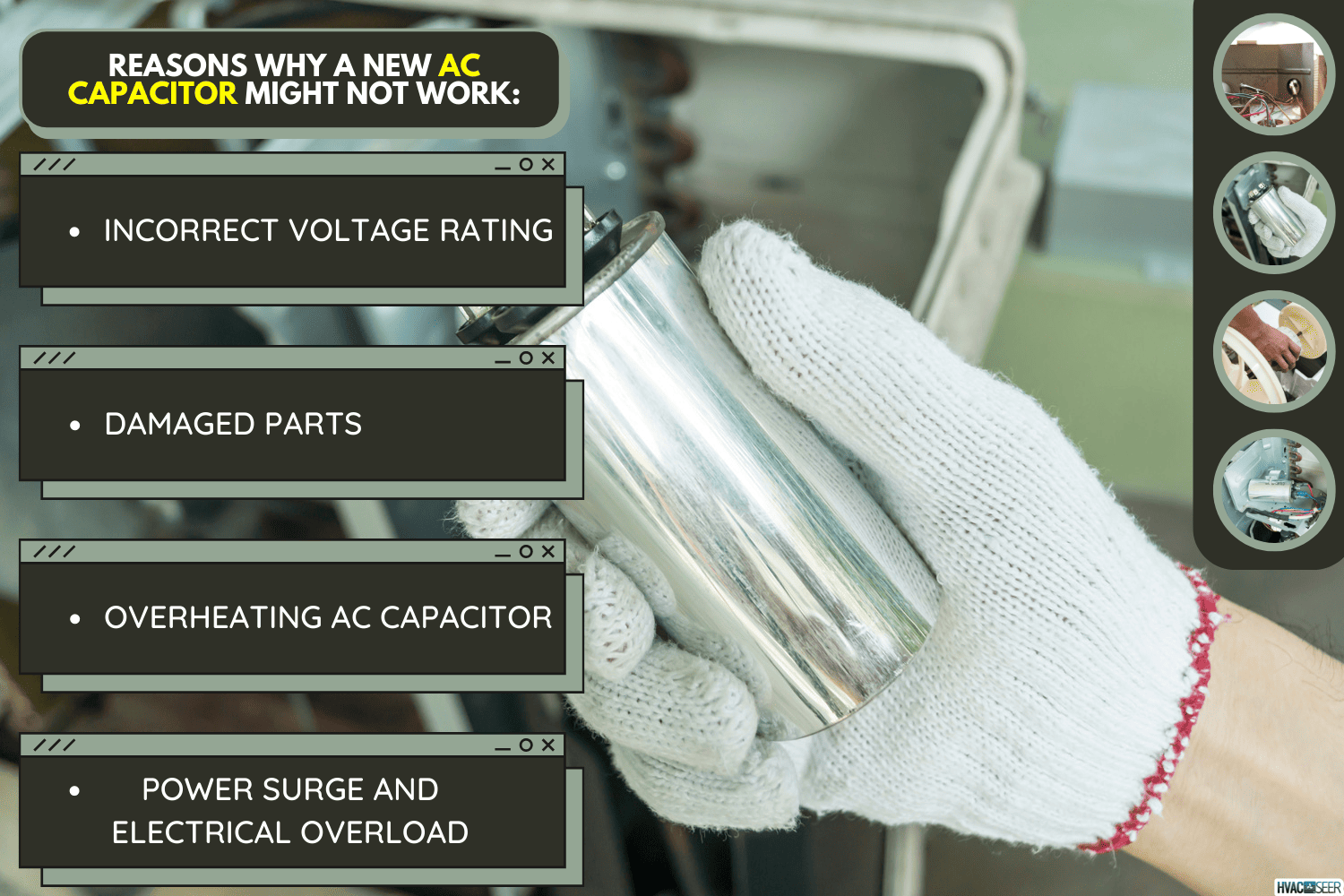
If your new AC capacitor isn't working, you should find out why and what you can do about it, so the unit doesn't break down completely.
Incorrect Voltage Rating
Voltage rating tells you how much electricity an AC capacitor can handle without becoming damaged. AC capacitors come in several varieties and have different voltage ratings.
It's not uncommon for technicians to pick AC capacitors with the wrong voltage rating. So even if your AC capacitor was just replaced, if the new one has an improper voltage rating, it can malfunction and be dangerous.
If you replace an older, higher-voltage capacitor with a lower-voltage one, the capacitor may not last as long as it usually would.
Using the AC capacitor to do a job it's not capable of will reduce its lifespan, and it won't be long until you have to do another repair or replace the capacitor again.
Here are some workarounds for this problem:
- You can compare the old and the replacement capacitors after unplugging and discharging the old ones.
- AC capacitors have voltage ratings and microfarads (F). You can find the voltage and microfarad information on the capacitor, which will read 35/5 uF and 370V.
- The microfarad must match, but the voltage rating does need not need to be the same as your existing capacitor. The voltage rating should be at least 1.5 times or twice the highest voltage it can handle.
Note: A slightly higher uF rating is an option, but not a lower one. You can replace 370 uF with 440 uF, but not the other way around. Compatibility with voltage, physical dimensions, and lead spacing is also necessary.
- Using a multimeter, check the capacitor and measure its voltage rating to find out if it is operating according to design requirements. You'll usually find the tolerance on the capacitor data tag.
- AC capacitors have specific connectors you have to attach in a precise way. Before you reattach them, double-check that they line up.
Check out this digital multimeter on Amazon.
Damaged Parts
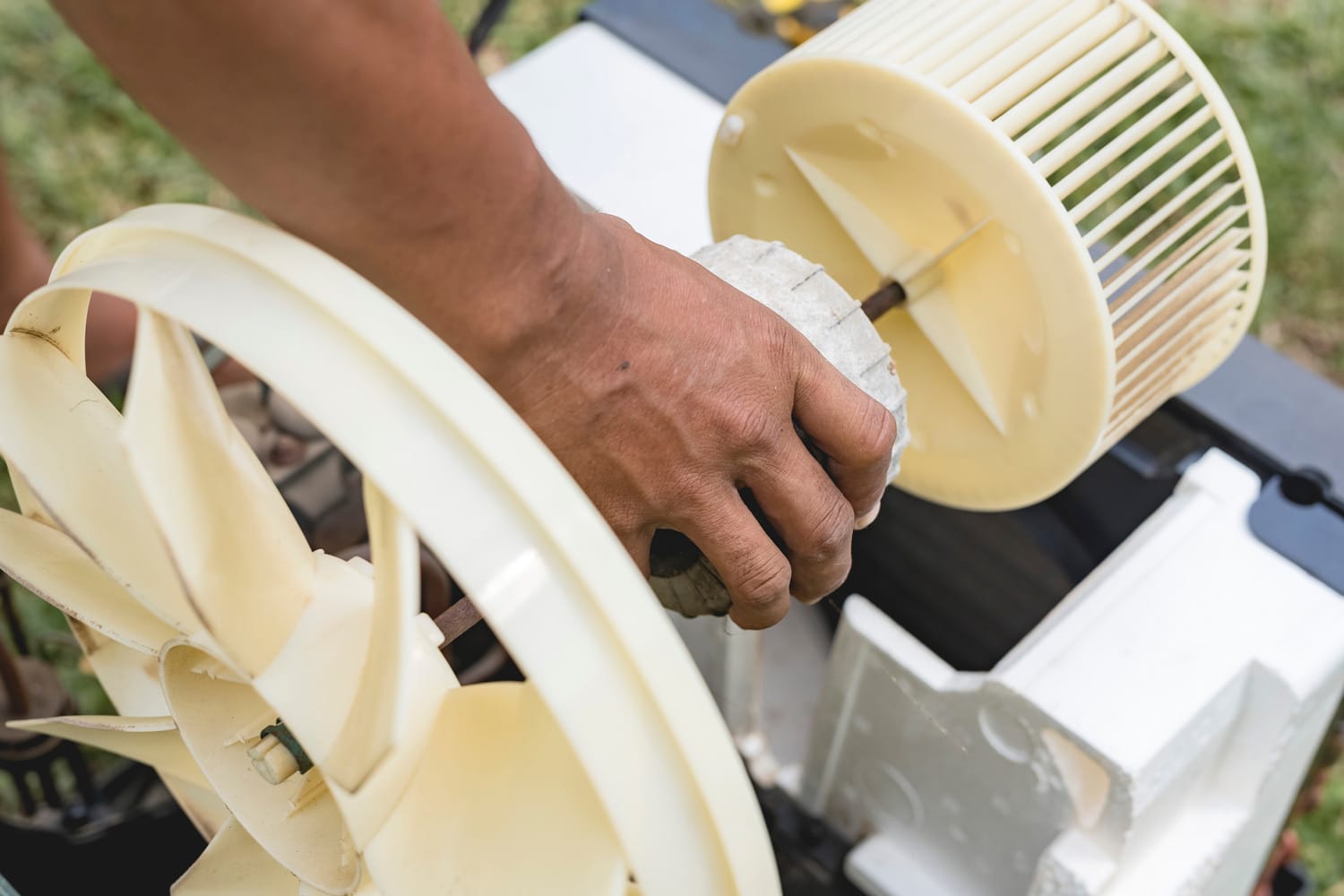
Even if you have a new and matching capacitor, it can still fail if other parts of the AC are faulty. You should inspect the whole AC unit. A damaged bearing in the compressor or fan motor could burn up a newly installed AC capacitor.
When checking for a faulty fan, there are some signs you should look out for. If your AC unit makes unusual noises when the fan turns on, something might be wrong.
Another possibility is debris in the way of airflow. This can make a lot of noise and slow the fan down. The only way to know if your AC fan is failing is by taking it apart and inspecting its components.
Here are some workarounds for this problem:
- You should immediately check the motor and air conditioner power if you suspect something is wrong.
- Verify that the compressor is getting the right amount of energy. The circuit breaker should not have tripped, so locate it and check. If the power is working, verify that the voltage is correct.
- Next, look for any shorts or openings in the fan motor windings. You must measure the ohms to accomplish this. Look for signs of resistance.
Note: A zero implies a short in the fan motor winding, which can trip the breaker. However, a perpetual reading could suggest an open motor winding. Both situations require replacing the fan motor.
- Replace the faulty fan motor. It should also be compatible with the most recent AC capacitor specs.
- You should also check the wiring and connections for damage.
Overheating AC Capacitor
Heat can affect an AC capacitor. Check for overheating issues even if you just replaced your AC capacitor.
The wet separator within the electrolytic AC capacitor will dry up if the component gets too hot, leading to an internal short circuit. Capacitors can malfunction if their temperatures regularly go above 150 degrees F.
AC capacitors can overheat if the relay switch doesn't work right and keeps them in the circuit for too long.
The combination of sunlight and an AC capacitor working hard for a long time can also lead to overheating. This can happen on hot days when you're using your air conditioner a lot.
Overheating can make an AC capacitor lose power efficiency because it can't maintain a charge. Overheating will shorten the capacitor's lifespan, so you'll have to replace it more often.
Here are some workarounds for this problem:
- It is necessary to check the AC unit and capacitor on hot days. Blocking your AC from direct sunlight will help it avoid overheating.
- In many cases, AC capacitors fail because of clogged or dirty condensate coils, which require more power from the compressor and fan. Check the coil on your condensate (outside unit) and clean any dirt or clogged grills.
- Consider replacing the relay switch if you have an old AC.
Power Surge and Electrical Overload
Although it's unlikely, lightning could strike your air conditioner during a storm and damage your AC capacitor
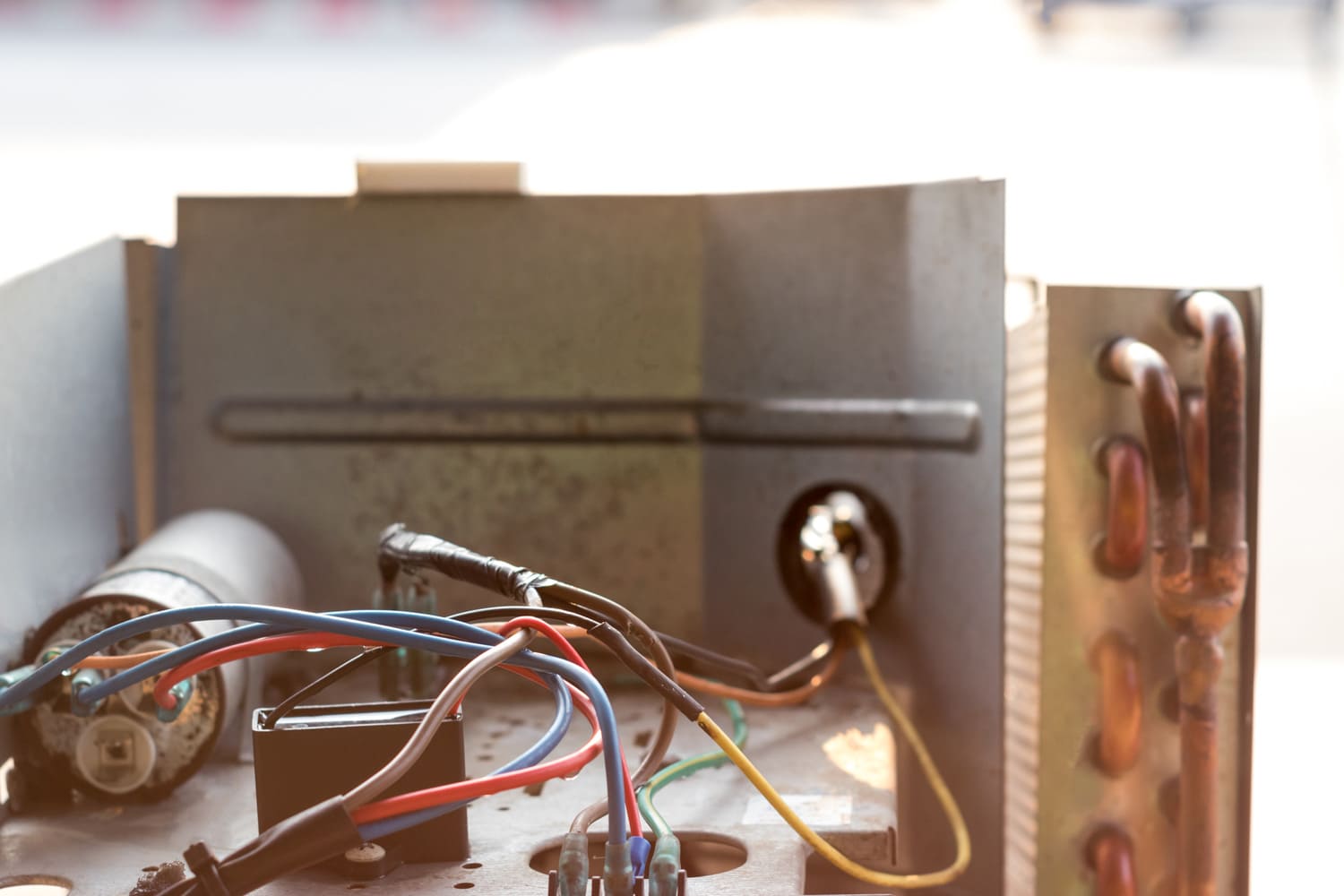
A mild power surge can also damage an AC capacitor because of power grid oscillations. Before the air conditioner capacitor disconnects the compressor and fan motors, they should reach about 3/4 of their operating speed.
Electricity demand shouldn't continue during this period. It will overcharge if the motor forcibly stops or burns out.
If power surges are too strong, they can damage your AC capacitor. It will either fail or become ineffective. If this happens, you’ll need to replace it again.
Here is a workaround for this problem:
- AC capacitor issues frequently following power outages. Surge protection can help shield AC components from damage if the power returns quickly.
Check out this HVAC surge protective device on Amazon.
What Wires Connect An AC Capacitor?
An AC capacitor usually has red, yellow, and white wires.
The red wire represents a power source, and the yellow wire controls the fan motor speed. The white wire represents the neutral side of the circuit.
Electricians commonly use capacitor wire colors as a benchmark. However, the proper wire colors used to match fan motor terminals, capacitor terminals, and wires may differ depending on the motor manufacturer, the application, and the age of the unit.
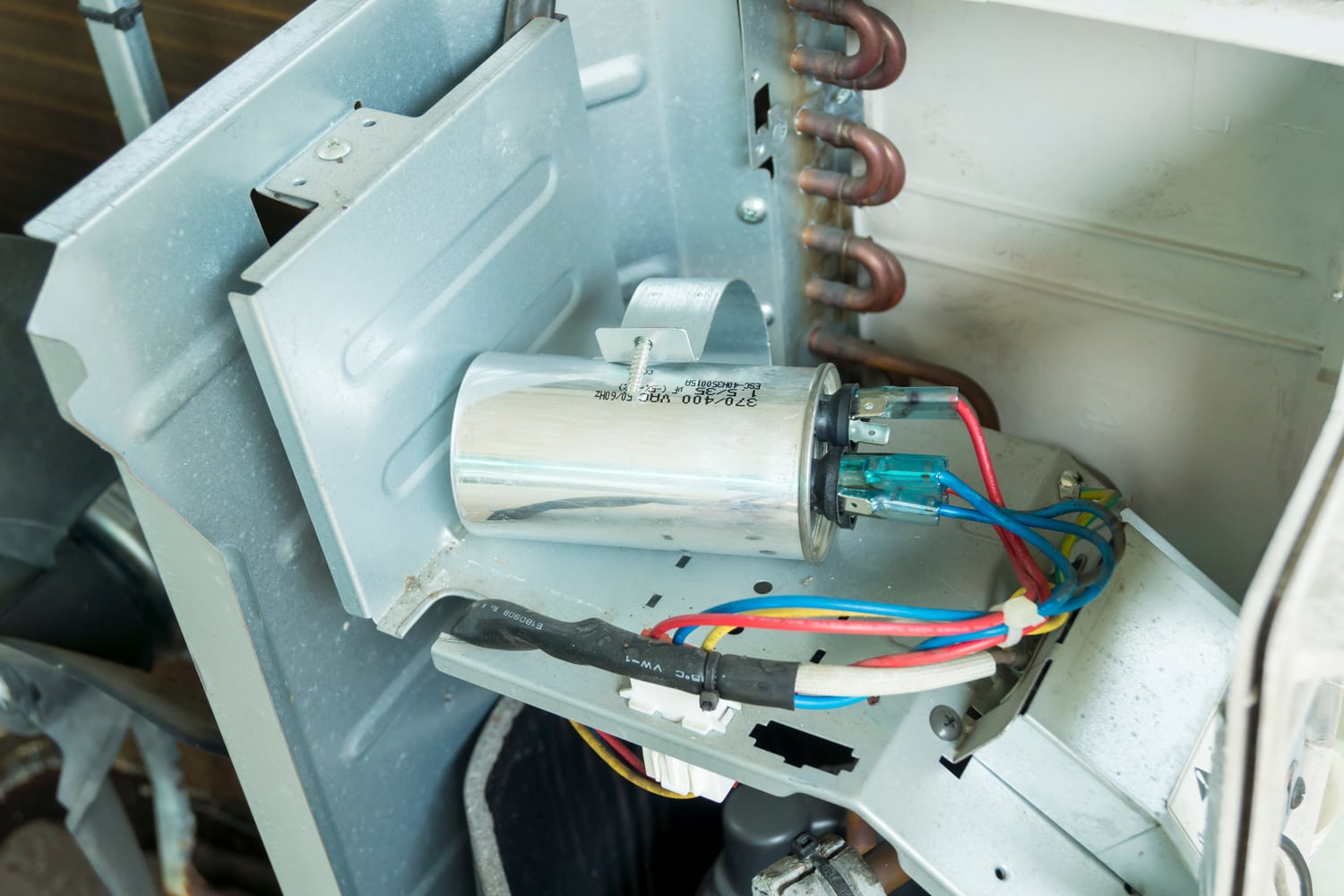
How Many Capacitors Are In An AC Unit?
AC units can have up to four capacitors. The number of capacitors can vary with each brand and model.
For instance, your outdoor unit may have one dual capacitor or two single capacitors, depending on the design of your HVAC system.
Are AC Capacitors Interchangeable?
Run capacitors and start capacitors aren't interchangeable because they differ in too many ways. Their design makes it easy for them to fit in specific spots on the AC.
An AC system would short out if you used start capacitors instead of run capacitors. Fan motors or compressors might stop working in that case.
What Is The Average Lifespan Of An AC Capacitor?
An AC capacitor has an average 10-year lifespan. Capacitors can last a long time, but that may vary depending on the type and frequency of use. That's why you should get a suitable AC capacitor for your unit.
Bottom Line
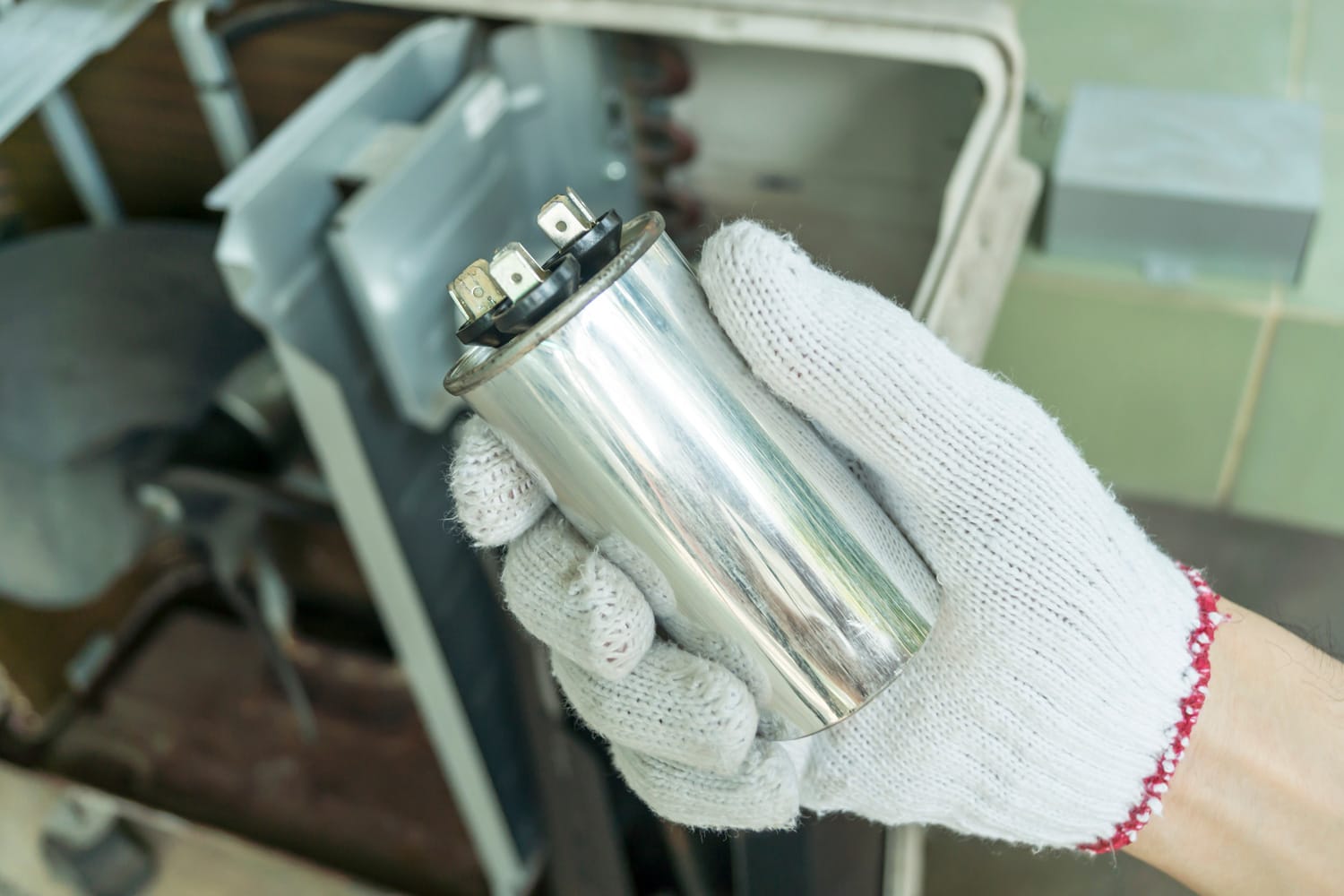
In this post, we've shown you troubleshooting tips for figuring out why your new AC capacitor isn't working. AC capacitors should last many years, but unfortunately, this is not always the case.
Check with a licensed HVAC company if you still can't fix your capacitor problem or you're not familiar with the electrical components.
A professional HVAC technician will have a better understanding of how the system works and should be able to determine if there are any issues with it.
To learn more about AC capacitors or related issues, check out these articles:


